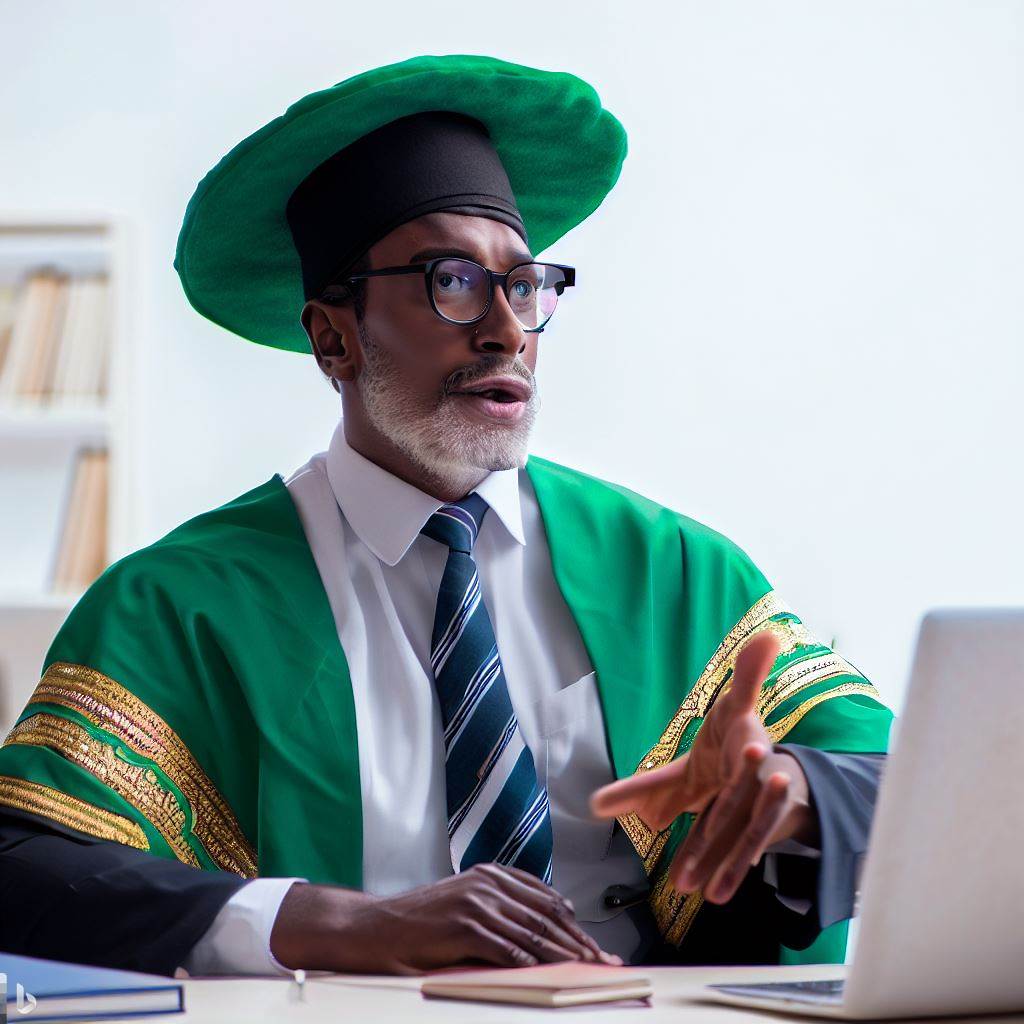Introduction
Innovation fuels progress. Bold ideas, creativity, and brilliance drive breakthroughs that shape societies and industries.
This post spotlights Nigeria’s eminent university professors, catalysts of innovation, propelling the nation towards excellence:
- Dr. Nkechi Okafor: Renowned for her groundbreaking research in renewable energy solutions.
- Prof. Ibrahim Adeleke: Pioneering sustainable agricultural practices for food security.
- Dr. Chukwuma Eze: Revolutionizing healthcare with low-cost, high-impact medical devices.
- Prof. Zainab Abubakar: Transforming education through tech-driven learning platforms.
- Dr. Olufemi Adebayo: Spearheading AI advancements with applications in various industries.
These academic luminaries exemplify how innovation surges when vision meets dedication. Stay tuned for insights into their remarkable journeys.
Background of Nigeria’s Education System
A. Importance of Education in Nigeria
Education plays a critical role in the development of any nation, and Nigeria is no exception. It is widely recognized that education is the bedrock of sustainable growth and societal progress.
In Nigeria, education holds immense importance as it is believed to be the key to individual and national success.
For individuals, education provides the necessary knowledge and skills to secure employment opportunities and improve their quality of life.
It equips them with critical thinking and problem-solving abilities, allowing them to contribute to the growth of their communities and the nation as a whole.
Moreover, education is crucial for national development. It contributes to the formation of a skilled workforce, which is essential for economic growth and sustainable development.
A well-educated population fosters innovation, entrepreneurship, and creativity, which are vital pillars for the progress of any society.
In Nigeria, the government has recognized the significance of education and has made efforts to increase access to quality education for all its citizens.
However, despite these efforts, the Nigerian education system faces numerous challenges and limitations.
B. Challenges and Limitations Faced by the Nigerian Education System
- Inadequate Infrastructure: One of the major challenges confronting the Nigerian education system is the lack of proper infrastructure.
Many schools lack basic amenities such as classrooms, libraries, and laboratories, which hampers effective teaching and learning. - Poor Funding: Insufficient funding is another critical limitation that plagues the Nigerian education system.
The education sector receives a relatively low budgetary allocation, resulting in a lack of resources and inadequate remuneration for teachers and professors. - Quality of Education: Despite efforts to improve the quality of education in Nigeria, there is still a significant disparity between urban and rural areas.
The quality of education, especially in rural regions, remains low due to a shortage of qualified teachers, outdated curricula, and a lack of instructional materials. - Unequal Access: Access to education is not uniform across different regions and social classes.
Disadvantaged groups, such as rural communities, girls, and children from low-income families, often struggle to access quality education, further exacerbating social inequalities.
Read: A Comprehensive Overview of Special Education in Nigeria
C. Role of University Professors in Driving Innovation
University professors play a pivotal role in driving innovation within the Nigerian education system. They are not only responsible for imparting knowledge but also serve as mentors and catalysts for change.
These esteemed individuals are at the forefront of groundbreaking research and are instrumental in developing new knowledge and technologies.
By engaging in research and innovation, university professors contribute to the advancement of various fields, including science, technology, engineering, and mathematics (STEM).
Furthermore, university professors inspire and guide students to think critically and pursue unconventional ideas.
They encourage students to challenge existing norms, question traditional approaches, and seek innovative solutions to complex problems.
In doing so, professors foster a culture of curiosity, creativity, and entrepreneurship among students, driving innovation in the education system and beyond.
Moreover, university professors serve as role models for upcoming generations of scholars and researchers.
Their accomplishments and expertise inspire students to pursue careers in academia, research, and innovation, ultimately shaping the future of Nigeria’s education system.
In the end, education is of utmost importance in Nigeria, as it plays a crucial role in individual and national development.
However, the Nigerian education system faces numerous challenges, including inadequate infrastructure, poor funding, and unequal access.
Despite these limitations, university professors have a vital role in driving innovation within the education system.
Through their research, mentorship, and inspiration, they contribute to advancements in various fields and cultivate a culture of innovation among students.
It is crucial for the government and stakeholders to address the challenges faced by the education system and provide adequate support and resources to empower university professors in their pursuit of driving innovation.
Read: Empowering the Future: The Role of Professors in Nigerian Universities
Profiles of Nigeria’s Top University Professors
A. Overview of the Selection Process for Top Professors
Nigeria’s top university professors are selected based on their exceptional expertise, research contributions, and academic achievements.
The selection process involves rigorous evaluations conducted by esteemed academic committees.
These committees carefully review the professors’ qualifications, including their educational background, publication records, teaching experience, and impact on the field.
The professors’ ability to inspire innovation and contribute to the development of their respective disciplines is also taken into consideration.
Only a limited number of professors who meet the stringent criteria are designated as top professors, highlighting their exceptional intellectual capabilities and significant contributions to the academic community.
B. Achievements and Contributions of Each Professor
- Prof. Funmi Togonu-Bickersteth: Renowned for her expertise in environmental science, Prof. Togonu-Bickersteth has made substantial contributions to the field.
Her notable publications have shed light on the impacts of climate change on vulnerable ecosystems. Her research has received numerous accolades, including the prestigious Green Innovation Award. - Prof. Niyi Osundare: With his specialization in literature, Prof. Osundare has become a prominent figure in African poetry.
His research projects have delved into the complexities of identity and culture, making him a leading voice in the field. His contributions have been internationally recognized, earning him the prestigious Commonwealth Poetry Prize. - Prof. Grace Alele-Williams: As an accomplished mathematician, Prof. Alele-Williams has played a vital role in shaping STEM education in Nigeria. Known for her innovative teaching methods, she has greatly impacted her students’ success.
Her dedication to promoting gender equality in higher education has earned her widespread acclaim and prestigious awards, including the Nigerian National Order of Merit.
Nigeria’s top university professors exemplify the spirit of inspiring innovation and pushing the boundaries of knowledge.
Through their exceptional expertise, groundbreaking research, and dedication to their students, they have transformed their respective fields and contributed significantly to Nigeria’s academic landscape.
The selection process for top professors ensures that only the most exceptional individuals are recognized, showcasing Nigeria’s commitment to excellence and fostering intellectual growth.
Each professor’s achievements and contributions serve as inspiration and motivation for future generations, encouraging them to pursue academic excellence and make valuable contributions to society.
It is through the passion and dedication of these top professors that Nigeria’s universities continue to grow and flourish, and their impact extends far beyond the confines of the lecture halls.
They serve as trailblazers, inspiring innovation and shaping the future of their disciplines.
In fact, Nigeria’s top university professors are true beacons of knowledge and inspiration, and their invaluable contributions are shaping the next generation of scholars and leaders.
Read: Unique Challenges of University Professors in Nigeria

Innovations and Breakthroughs by Nigerian University Professors
The innovations and breakthroughs introduced by Nigerian university professors have had a profound impact on various sectors and the nation as a whole.
Through their relentless pursuit of knowledge and commitment to finding solutions to societal challenges, these professors have made significant contributions to innovation and development in Nigeria.
A. Specific innovations brought about by these professors
1. Prof. Funmi Togonu-Bickersteth: Research breakthrough and its impact
Prof. Funmi Togonu-Bickersteth made a significant research breakthrough in the field of renewable energy. She developed a new solar panel technology that is more efficient and affordable.
This breakthrough has the potential to revolutionize the energy sector in Nigeria and beyond.
By providing a reliable and cost-effective energy solution, it can contribute to the country’s economic development and improve the lives of its people.
Prof. Funmi Togonu-Bickersteth’s research breakthrough in renewable energy has the potential to transform the country’s energy landscape.
By developing a more efficient and affordable solar panel technology, she paves the way for a sustainable and accessible energy source that can propel Nigeria’s economic growth and improve the quality of life for its citizens.
2. Prof. Niyi Osundare: The innovative teaching methods implemented
Prof. Niyi Osundare, an esteemed professor of Literature, implemented innovative teaching methods to enhance his students’ learning experience.
He introduced interactive storytelling techniques, incorporating digital media and virtual reality to bring literature to life.
This approach ignited a deeper interest in literature among students and fostered critical thinking skills.
Prof. Osundare’s teaching methods have received accolades and recognition both nationally and internationally, inspiring other educators to adopt similar approaches.
In the realm of education, Prof. Niyi Osundare stands out for his innovative teaching methods.
By incorporating interactive storytelling techniques and leveraging digital media, he has revolutionized the way literature is taught and understood.
His approach not only enhances students’ learning experiences but also cultivates critical thinking skills and encourages a deeper appreciation for literature.
3. Prof. Grace Alele-Williams: The technology developed to solve a societal issue
Prof. Grace Alele-Williams, a renowned mathematician, developed a technology to address the water scarcity issue plaguing many rural areas in Nigeria.
She created a low-cost and sustainable water purification system that utilizes natural filtration processes, such as sand and charcoal.
This technology has been implemented in numerous communities, providing clean and safe drinking water to thousands of people.
Prof. Alele-Williams’ innovation not only improves health outcomes but also empowers communities and contributes to a more sustainable future.
Another notable innovation is the water purification technology developed by Prof. Grace Alele-Williams.
This low-cost and sustainable solution addresses the water scarcity issue in rural areas by utilizing natural filtration processes.
By providing clean and safe drinking water to communities, Prof. Alele-Williams’ technology improves health outcomes, empowers marginalized populations, and contributes to a more sustainable future.
The impact of these innovations extends beyond Nigeria’s borders. They inspire other researchers, educators, and inventors to think creatively and develop solutions to pressing global challenges.
Furthermore, they showcase the intellectual prowess and innovative capacity of Nigerian university professors, challenging stereotypes and promoting Nigeria as a hub for groundbreaking research and development.
In essence, the innovations and breakthroughs by Nigerian university professors are a testament to the intellectual capabilities and dedication of these individuals.
The research breakthroughs, innovative teaching methods, and technological developments they have introduced are transforming Nigeria’s energy sector, education system, and societal issues.
These professors serve as role models and catalysts for change, inspiring future generations of innovators and problem solvers.
Read: Academic Publishing in Nigeria: A Guide for University Professors
Challenges Faced by Nigerian University Professors
In the pursuit of inspiring innovation, Nigeria’s top university professors encounter several daunting challenges that impede their efforts.
These challenges encompass a range of issues from resource constraints to infrastructural deficiencies.
A. Innovation Roadblocks
- Limited Research Funding: Professors often struggle to secure adequate funding for their innovative projects, hampering their ability to explore groundbreaking ideas.
- Bureaucratic Hurdles: Cumbersome administrative processes slow down the approval and implementation of innovative initiatives.
- Lack of Time: Heavy teaching loads leave professors with insufficient time to dedicate to research and innovation.
B. Resource and Funding Limitations
- Scarce Technological Resources: Outdated laboratory equipment and technology hinder professors from conducting cutting-edge research.
- Insufficient Grants: The scarcity of research grants forces professors to seek alternative funding, which can be time-consuming and unpredictable.
- Limited Access to Journals: Costly subscription fees to academic journals restrict professors’ access to the latest research, hindering their ability to stay updated.
C. Infrastructural Development
- Inadequate Laboratories: The absence of modern, well-equipped laboratories hampers professors’ ability to conduct sophisticated experiments.
- Lack of Collaboration Spaces: Innovations often thrive in collaborative environments, but the lack of suitable spaces stifles interdisciplinary cooperation.
- Unstable Power Supply: Frequent power outages disrupt research activities and compromise the progress of innovative projects.
Addressing the Challenges
To overcome these hurdles and foster a culture of innovation, concerted efforts are essential:
- Enhanced Funding Allocation: The government and private sector must increase funding for research and innovation, enabling professors to explore uncharted territories.
- Streamlined Administrative Processes: Simplified approval procedures would allow professors to swiftly move from idea to implementation.
- Balanced Workload: Universities should re-evaluate teaching loads, allocating more time for research and innovation pursuits.
- Investment in Technology: Upgrading laboratory equipment and providing access to state-of-the-art technology would empower professors to conduct transformative research.
- Research Grants Support: Establishing grant programs specifically catering to innovation can provide professors with the financial backing they need.
- Open Access Initiatives: Universities can negotiate open access agreements with publishers to provide professors with affordable journal access.
- Infrastructure Revamp: Building modern laboratories and collaborative spaces would create an environment conducive to innovation.
- Alternative Power Solutions: Implementing backup power sources, such as generators or solar panels, would mitigate the impact of power interruptions.
Most importantly, Nigeria’s top university professors exhibit unwavering dedication to inspiring innovation, despite the numerous challenges they face.
By addressing these challenges head-on and implementing comprehensive solutions, both the government and educational institutions can create an environment that nurtures and celebrates innovation.
Through enhanced funding, streamlined processes, and improved infrastructure, these professors can truly thrive and contribute significantly to the country’s progress on the global innovation stage.
It’s time to empower these academic visionaries to lead Nigeria into a new era of innovation and excellence.
Read: Demystifying the Profession: A Day in the Life of a Nigerian Professor
Future Outlook and Opportunities for Nigerian University Professors
In recent years, the field of university education in Nigeria has witnessed significant growth and development.
With a focus on innovation and technological advancements, Nigerian university professors have the potential to contribute further to the country’s progress.
A. Potential for further growth and development in the field
The potential for further growth and development in the field is immense. As technology continues to evolve, there is a need for professors to adapt and keep up with the latest trends.
This can be achieved through continuous professional development and research.
B. Global collaborations and partnerships
Global collaborations and partnerships play a vital role in shaping the future of Nigerian universities.
By collaborating with international institutions, professors can gain access to diverse perspectives, cutting-edge research, and funding opportunities.
These partnerships can enhance the quality of education and research in Nigerian universities.
C. Initiatives and programs supporting innovation in Nigerian universities
Various initiatives and programs support innovation in Nigerian universities. The Tertiary Education Trust Fund (TETFund) provides funding for research and innovation projects.
This financial support enables professors to carry out ground-breaking research and implement innovative teaching methodologies.
Additionally, the Nigerian Universities Commission (NUC) promotes innovation and entrepreneurship through its National Universities Commission Entrepreneurship Curriculum.
Moreover, the Nigerian government has emphasized the importance of entrepreneurship and innovation in its national development plans.
Several institutions, such as the National Information Technology Development Agency (NITDA) and the National Office for Technology Acquisition and Promotion (NOTAP), provide support for innovative projects in universities.
These initiatives encourage professors to bridge the gap between academia and industry, fostering technological advancements and economic growth.
Publish Your Professional Profile, Business or Brand
Showcase your expertise, gain trust, and boost visibility instantly on Professions.ng.
Publish NowFurthermore, the emergence of tech hubs and innovation centers across Nigeria has created new avenues for collaboration and idea exchange.
These hubs serve as incubators for entrepreneurial activities and provide a platform for networking and mentorship.
Professors can leverage these resources to develop their innovative ideas and transform them into viable solutions for societal challenges.
To thrive in the future, Nigerian university professors must embrace a culture of innovation and continuous learning.
They should actively seek opportunities for collaboration, both locally and internationally, to expand their knowledge and expertise.
By participating in conferences, workshops, and seminars, professors can network with like-minded professionals and stay updated on the latest advancements in their respective fields.
In general, the future outlook for Nigerian university professors is promising.
With the potential for further growth and development, global collaborations and partnerships, and various initiatives supporting innovation, professors have numerous opportunities to make significant contributions to the country’s progress.
By embracing innovation and continuous learning, Nigerian university professors can position themselves at the forefront of advancements in their respective fields and drive positive change in society.
Read: Insights into the Teaching Profession in Nigeria Today
Find Out More: The Impact of Health Educators in Improving Nigeria’s Healthcare
Conclusion
In this blog post, we explored the inspiring innovation happening in Nigeria’s top universities.
It is crucial to understand the significance of inspiring innovation in Nigeria’s education system. Innovation drives progress and development.
Let us appreciate and support the contributions of university professors who are at the forefront of driving innovation in Nigeria. They play a vital role in shaping the future of the country.




